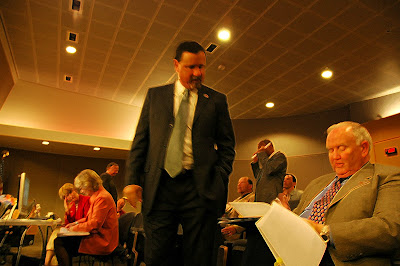 |
| Louis J. Cella, Jr. |
In that article (Notorious O.C. political kingmaker dies), Martin Wisckol reported that
Louis J. Cella Jr., Orange County’s biggest political donor before being convicted of embezzlement in 1976, died Nov. 7 after a lengthy neurological illness. He was 87 years old.Hmmm. According to an article in today’s LA Times (Dr. Louis J. Cella Jr. dies at 87), Cella was a registered Republican, though he “mainly supported Democratic candidates….”
Cella was born in Providence, R.I., on Aug. 21, 1924, and received his medical doctorate from Marquette University in 1948. [According to the Times, he was expelled for cheating from his first med school.] In the early 1950s, he moved to Orange County and joined the Santa Ana Clinic in downtown Santa Ana.
By the late 1960s, Cella was contributing heavily to state and local campaigns. In 1974, he made $550,000 in political donations, the most of any individual in California. He was particularly interested in the Board of Supervisors and their potential to control health-care facility licensing, according to a 1987 Register profile. He was key to getting four supervisors elected: Robert Battin, Ronald Caspers, Ralph Clark and Ralph Diedrich. All but Caspers were – like Cella – Democrats.
Wisckol goes on:
Even by Orange County’s lively political standards, it was a wild time, with 42 Orange County politicians and political aides indicted between 1974 and 1977.OK then. The corrupt Cella supported OC Supes (1) Battin, (2) Caspers, (3) Clark, and (4) Diedrich. Battin and Diedrich were eventually convicted of crimes. Clark managed to ride out the scandal, though he gave up his Supe seat in 1986 partly owing to persistent accusations that he had had unsavory dealings with notorious “corrupter” W. Patrick Moriarty. (I think the DA persuaded him to step down.)
Battin was convicted of illegally using county staff for campaigning. Diedrich was convicted of taking bribes from a developer in exchange for a rezoning vote. Caspers died at sea in a boating accident.
I remember Clark. He was an old-fashioned, glad-handing politician. Some people loved 'im.
Yes, Caspers, the Republican, died in 1974. As far as I know, his boat and his body were never found (one hears rumors, from older reporters, that foul play was likely afoot).
Caspers’ right-hand man was, of course, a young Tom Fuentes, whom Nathan Rosenberg once described as “Caspers' bagman.” (See LA Times, Badham vs. Rosenberg at TV Taping, May 20, 1986).
Rosenberg is a Boy Scout, so I believe 'im.
Fuentes’ reaction to Caspers’ death was extreme: he entered a seminary. But that didn’t take. Six months later, he left the seminary and became a "consultant." As near as I can tell, he was the kind of consultant who wined and dined certain key persons on behalf of certain companies. He was very good at that. By '84, he was OC GOP chair, where he became legendary for his wining and dining accomplishments.
It’s all very strange.
Wisckol snooped around some old Register stories, where he learned that
In 1976, Cella was convicted of 22 federal counts related to embezzling at least $600,000 in Medi-Cal funds through two Orange County hospitals in which he had an ownership stake. He served 32 months of a five-year sentence.The source? He stole it. Well, it’s all very delicious, isn’t it? We’ll probably never know all the details.
Before his indictment, Cella also oversaw a political literature print shop in one of his hospitals, provided candidates with hospital-paid phone banks, and paid candidates for phantom jobs while they were out campaigning, according to the 1987 Register story.
The story also notes that before his indictment, “Little was known about the source of his apparent immense wealth.”
These guys are all dying.

See also Louis J. Cella, Former Orange County Political Power Broker, Dies at 87 (Voice of OC)








































